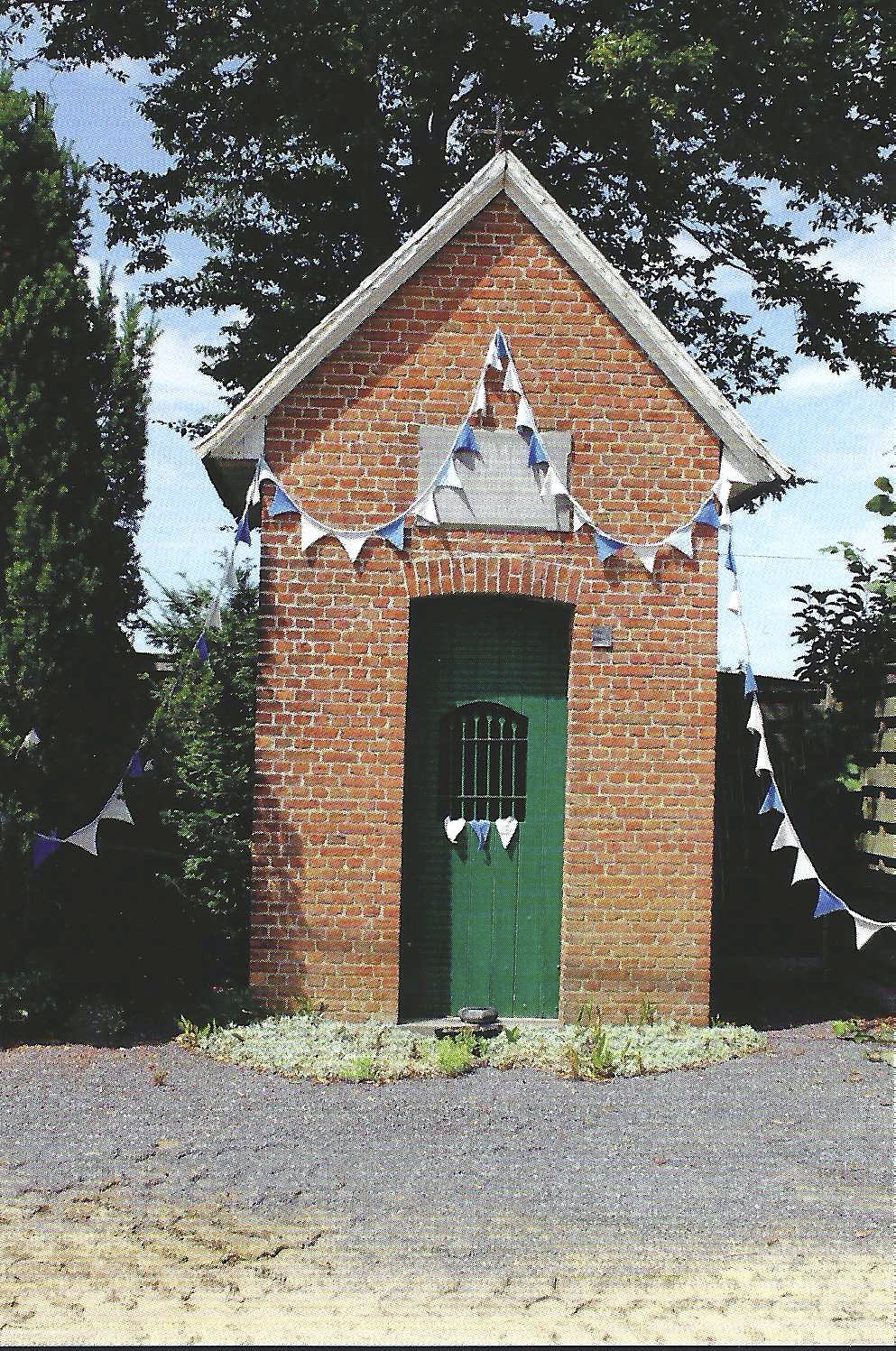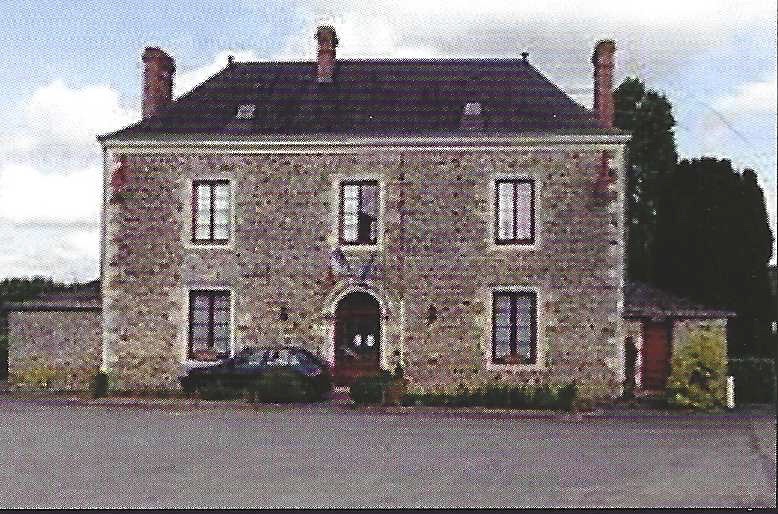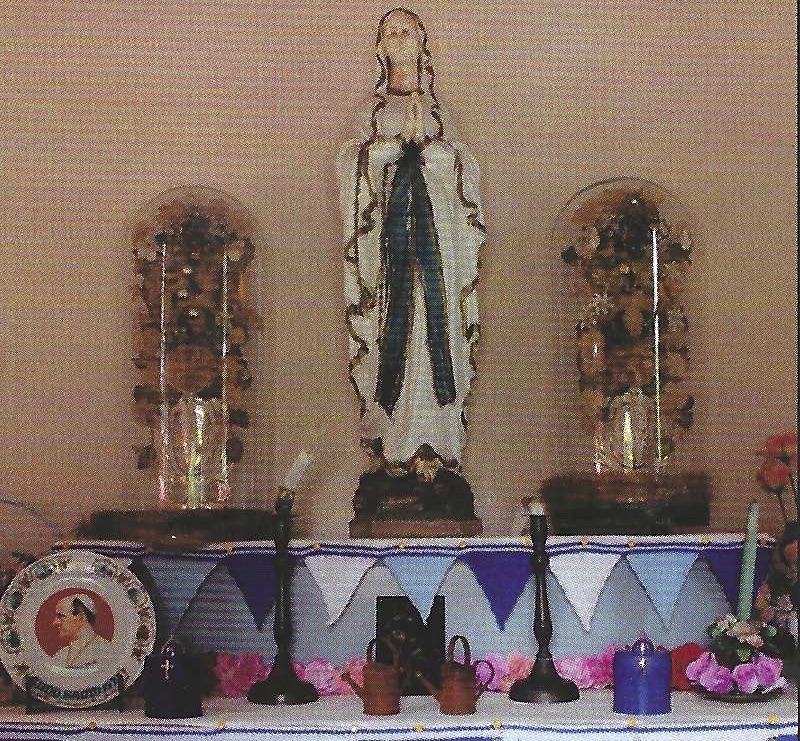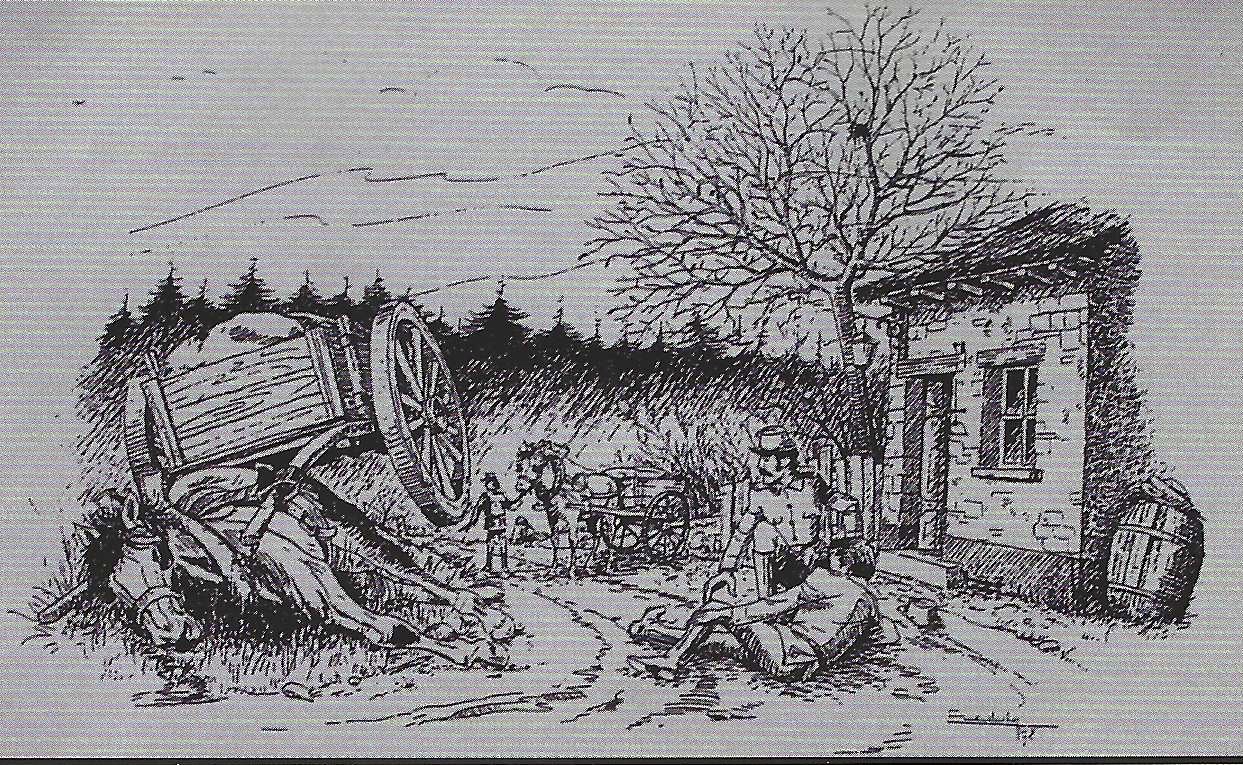Family Tree : Planchenault in Belgium
Family history : Louis Planchenault, constable in Herselt
Source : Trimestrial magazine "Het Neteland" of the Historical Society "Heemkundige Kring Ansfried Westerlo vzw"
Volume 24 nr. 4 (December 2019)
Based on an article written by Jef Thys
Website : www.hkansfried.be

The chapel
In Herselt, alongside the "Oude Baan", close to "Ollemanshoek", on the old road to Bergom, one can find a beautifully maintained little chapel.
The altar in the chapel is covered with crocheted decorations.
A statuette of Our Lady of Lourdes is positioned in-between 2 glass bells, each containing beautiful little vases with artificial flowers.
A couple of chandeliers and small decorative artefacts ...
The neighbour maintains this chapel regularly. With great attention to detail !
Harder to see is the stone in the backside, which is engraved with the date of July 30th, 1910.
Most likely this is the date of a thorough restoration of the chapel.
Above the front chapel door a large memorial stone can be seen, which now reads clearly:
“Bid voor de ziel van zaliger Louis Planchenault. Geboren te Simplé in Frankrijk en hier schielijk overleden den 8 november 1823.”

Memorial stone
This kind of inscription raises our attention, we want to know more about this. Guy Planchenault from Westerlo put us on the right track.
The magazine HKW 1979-1 explains in an article by late Doctor De Belie. As this trimestrial magazine, a passionate pet project of late Marcel Govaerts, was printed in limited quantity, and it has been over 40 years since this issue was released, we are bringing the story (with some minor adjustments) again in print to our readers.
Doctor Wilfried De Belie researched the story in the seventies with the old town pastor, who still had vague memories. Other than him, nobody else seemed to remember anything about this mysterious chapel.
With help from J. Heyns, the town secretary of Olen, the pastor was able to dig up an old document.
The original text of that article was written down by Remi-Eugène Planchenault (º1875 - †1925), school teacher in Geel, later in his life resided in Olen. He had gotten the information from his father Frans-Lodewijk Planchenault (º1829 - †1899). This Frans-Lodewijk on his turn had heard the information from his father Jean-François Planchenault (º Mol 1799) who was a son of Louis Planchenault, the man this article is written about.
Doctor De Belie published the story in HKW, and also entered it into the “review van de rijkswacht” (the national "gendarmerie" magazine) in 1979-1.

Town hall of Simplé
Louis Planchenault was born in 1756 in Simplé, a little village in the Vendée, France, Département Mayenne, arrondissement Château-Gontier.
His parents were simple farmers-tenants that worked a "closer" (leased farm), owned by the church administration.
By the time Louis was due for being drafted for serving in the military, his father was advised by the local pastor to enlist him in the customs service, so that he would be "free of military duties" after 2 years ...
During his service in the customs service, both of his parents passed away and the farm transferred into different hands. Therefore Louis stayed in the customs service.
Being stationed at the border with Spain, Louis' job was made redundant after Napoleon conquered that country and the border was in effect eliminated. He had to look for other employment.
Although the only other craft he knew was farming, he still decided to purchase a carriage to be pulled by his service horse, to make a living transporting wine
In this period, Louis married Maria Francisca Boulon.
After the French conquered the Southern Netherlands, customs officers were again needed to guard the border with Holland. Louis was commissioned there.
But meanwhile Louis had become a widower with 4 little children. With horse and carriage ~ the children tucked away in sheepskins wool on the inside ! "warm as little "moles" said his kids ~ they left to Belgium.
During the travel, in Lille, Louis married Desirée Leclerc.
His first station as customs officer in Belgium was Oud-Turnhout. Frans-Lodewijk Planchenault left following anecdote about this period:
Anecdote:
One day, while he was cleaning his boots, shirt sleeves rolled up, customs officer Planchenault saw a 'voiture' approach from far. He tapped the guard house window to ask for his tunic so he could inspect the carriage in uniform. After inspection, he could not identify any items for which customs duties were owed.
While dismounting the carriage, the fat driver wanted to offer Louis something, but Louis refused resolutely. This ‘gesture’ raised Louis' suspicion. He therefore decided to also inspect the driver. This however could not be done in the middle of the street, so they went into the inn nearby. The station lieutenant was bedridden there with a broken leg. A fellow officer was knitting leisurely.
Louis discussed the matter with the lieutenant who agreed to have the man searched. When Louis approached the man to do that, he suddenly drew a pistol. Louis grabbed his arm and pushed it upward so nobody would get hurt. Both officers overpowered the coach driver.
What appeared to be the case after further investigation ? It was the Austrian-Dutch tax collector, Dupuis, on the run to Holland with the treasury!

Altar
Later, Louis was transferred to the customs station in Mol.
When he travelled into Mol with his carriage, pots and pans hanging on the outside, someone made the remark "that must be a 'marketenter' ..."
The Planchenault family long kept carrying the nick name ‘van de Merketenter’ after this (a marketenter is a kind of market merchant who would sell his merchandise door-to-door and in earlier times often would follow army troops).
Also about this stay in Mol Frans-Lodewijk recounted an anecdote:

Sketch of unknown provenance
Anecdote :
3 customs officers returned around dusk from an inspection in Turnhout. They heard some noises coming from approaching carriages across the moorlands. This was suspicious! They agreed to put up an ambush, and were able to intercept no less than 34 carriages of contraband!
Overpowering all those drivers however was a different matter! These drivers were convinced they could overcome 3 officers in a fight. One of the officers shouted out: ‘A moi, Planchenault, on m’assasine !’, meaning: ‘Planchenault, help me, they're killing me!’
Louis fired his gun and shot one of the smugglers' horses in the head, after which the drivers chose to take flight and abandon their convoy! When the officers reported the incident to their lieutenant, one of them mentioned that a parcel was packed on the back of the killed horse. The lieutenants response was ‘Then you'll have to go collect that parcel on your own!’
This parcel contained precious Dat pak bevatte kostbaar lacework from a ‘monarch’! It may have belonged to Willem V, who had fled to England. The French 'confiscated' in those times just about anything they could ... they needed the money to fund the war.
Frans-Lodewijk recalled that his grandfather had received a quite significant finders fee, but couldn't remember the exact amount …
Another anecdote from Mol:
A new lieutenant was appointed to the station; Louis Planchenault had meanwhile been promoted to under-lieutenant.
The new lieutenant was known to be susceptible to bribes by smugglers. One morning, grandfather went to collect his orders with the new lieutenant and found him still in his bed.
Grandfather reprimanded the lieutenant : ‘Are you still in bed? Smugglers have already passed the station!’
‘What?’ said the lieutenant. ‘Are you now giving me orders?’ He jumped out of bed, and while putting on his tunic lots of golden Louis coins fell out of his pockets.
Grandfather commented: ‘Tiens, mon lieutenant, vous êtes si riche?’ ‘Yes’, the lieutenant answered, ‘Yesterday I sold a horse.’
I know better than that, grandfather must have thought, and he said 'I'm riding to Turnhout, will you accompany me?’
He refused.
In Turnhout grandfather told his observations to the inspector, who immediately decided to ride back to Mol with him. The new lieutenant was discharged of his duties!
Also this happened in the end in Mol:
Grandfather's horse had gotten old, and one day he accompanied a horse merchant from Mol to the market in Gorkum. They both purchased a horse.
When riding back home, it had frozen quite a bit. The road was slippery, and the horses' hooves were not equipped for this condition.
The riders dismounted and continued the trip while talking. Suddenly grandfather's horse tripped and fell on top of him.
His leg was broken. Grandfather refused to stop for administering care to his leg, and he stumbled on to Mol.
The healing took months and was quite painful. He now had one leg a bit shorter than the other one.
This forced him to resign his office in the customs service. He then requested his (French!) pension.
At the time, he had 7 children, and his pension was not sufficient to feed his family!
Louis set out to look for new employment …
In Herselt the post of constable was vacant, and he applied for it. He got the job. This was around 1810, still in the French period.
In Herselt Louis served for 13 years. About this period, Frans-Lodewijk Planchenault told the following anecdote:
Louis had caught a stealing woman, and wrote up a report. That woman was telling people that grandfather's dog had bitten her. When her case came to trial in Turnhout, she had herself carried to Turnhout by carriage! Her leg was bandaged, it was too horrible a sight.
The judge noted that letting a dog bit other people was unacceptable! The case was kept under consideration for 14 days.
The next Sunday, Westerlo-fair took place, and father went there with other youngsters from Herselt. He partied all night through, and when he came back home the next day he was reprimanded severely by grandfather, who kept pushing on. Father asked if he could say a word too.
Father now told that he (and 2 other witnesses) had seen that woman danse during the fair. ‘Such a good deed ...’ said grandfather, and the reprimand was over and forgotten!
Grandfather now saw the opportunity to inform the judge in Turnhout in private before the judge was about to pass his ruling on the thief with the dog bite. She again had herself brought to Turnhout by carriage. ‘Madam’, said the judge, ‘last Sunday there was a fair in Westerlo, did you attend that fair?’ …
In the end, she reluctantly admitted she had been on the fair and quietly admitted to having danced there. She went to jail!
And the wounds on her leg? you might ask yourself. This riff-raff had knowledge of certain plants that - when put on your limbs - would cause serious inflammation.
The young woman had thought to take advantage of this trick to save herself …
On November 8th 1823, some peasants in Herselt had arrested a vagabond, most likely suspected of theft. They called for the support of the constable to turn the scoundrel over to the gendarmerie. Grandfather took in his impressions of the scoundrel and must have mentioned: 'This looks like a first class rascal!, I will take my rifle with me to escort him.'
My late father offered to accompany him, but grandfather wouldn't hear of it. He put fresh powder in the pan and charged a bullet in the rifle and said: 'I have my gun and my dog, who will harm me?' And he left with the vagabond to the gendarmerie of Westerlo.
About 15 minutes walk out of Herselt, alongside the "Oude Baan", was an in, named ‘De Mageren Koolhof’. When they passed the inn, the prisoner complained about thirst so badly that grandfather consented to stop briefly to drink something. The lady inn-keeper was in the establishment wit a little child on her arm, and to get some beer she put the child on grandfather's lap for a while. Grandfather meanwhile had put his rifle behind him, in the corner by the fire place.
Suddenly, the villain took advantage of the situation to jump up and reach for the rifle. He immediately fired it at grandfather and fled out the door, chased by the dog that followed him well into the woods. When later the Planchenault family saw the dog come home alone, they feared an accident had happend. They went out to search, and found their father dead in the inn. The child had remained unharmed, but the bullet had been fired at close range leaving the constable without any chance to survive … The name of the inn-keeper is not known, but in 1845 a ‘cabaretière’ widow of Norbert Eens lived there. Cabaretière was the French term for a female inn-keeper. From the atlas of the local roads, this appears to now be the house with number 12, along the Oude Baan, back then the main road to Westerlo through Bergom.
The escaped villain has probably hidden for a while in the woods. After the death bells were rung for grandfather-constable Planchenault, he fled up north, to Holland. After the revolution of 1830, he allegedly has attempted returning into our country, but because of all the revolutionary events was not pursued anymore by the police or the courts
After Napoleon fell, in 1815, grandfather had renounced his French citizenship to be able to keep his constable post in Herselt.
For grandmother Leclerc to still get his widowers pension, the then municipal secretary Van Calster drew up the death certificate in such a way as if grandfather was still a French national, travelling through the area and succumbing to a tragic accident … because in the newly founded Netherlands (1815 to 1830) no pension accommodations had been installed yet …
At the place of the 'murder', later a chapel was built between houses numbered 12 and 14.
At first a small wooden chapel; most likely in 1910 restored and rebuilt as a brick chapel as it is currently still in existence.
Widow Désirée Leclerc received her humble pension, but had to move back to France for that. She moved back to Lille, and lived in the Rue De Paris, ‘au coin de la Rue Dragon’.
Every year she would visit her children here in Belgium. She would stay for 2 months with her son in Olen, 2 months with her daughter in Mol and 2 months with her son in Turnhout.
In the Olen area the name Planchenault still occurs sporadically:
In Westerlo is where Guy Planchenault (º1941) lives, his son Philip (º1966) who also has a son Xxxxx (*) and 2 daughers Aricia and Xxxxx (*), who can still carry on the family name
Guy also has a daughter Anne (º1963) who has a son Louis, also carrying the family name Planchenault.
The family name will not disappear any time soon in the Campine!
(*) name hidden pending privacy consent


